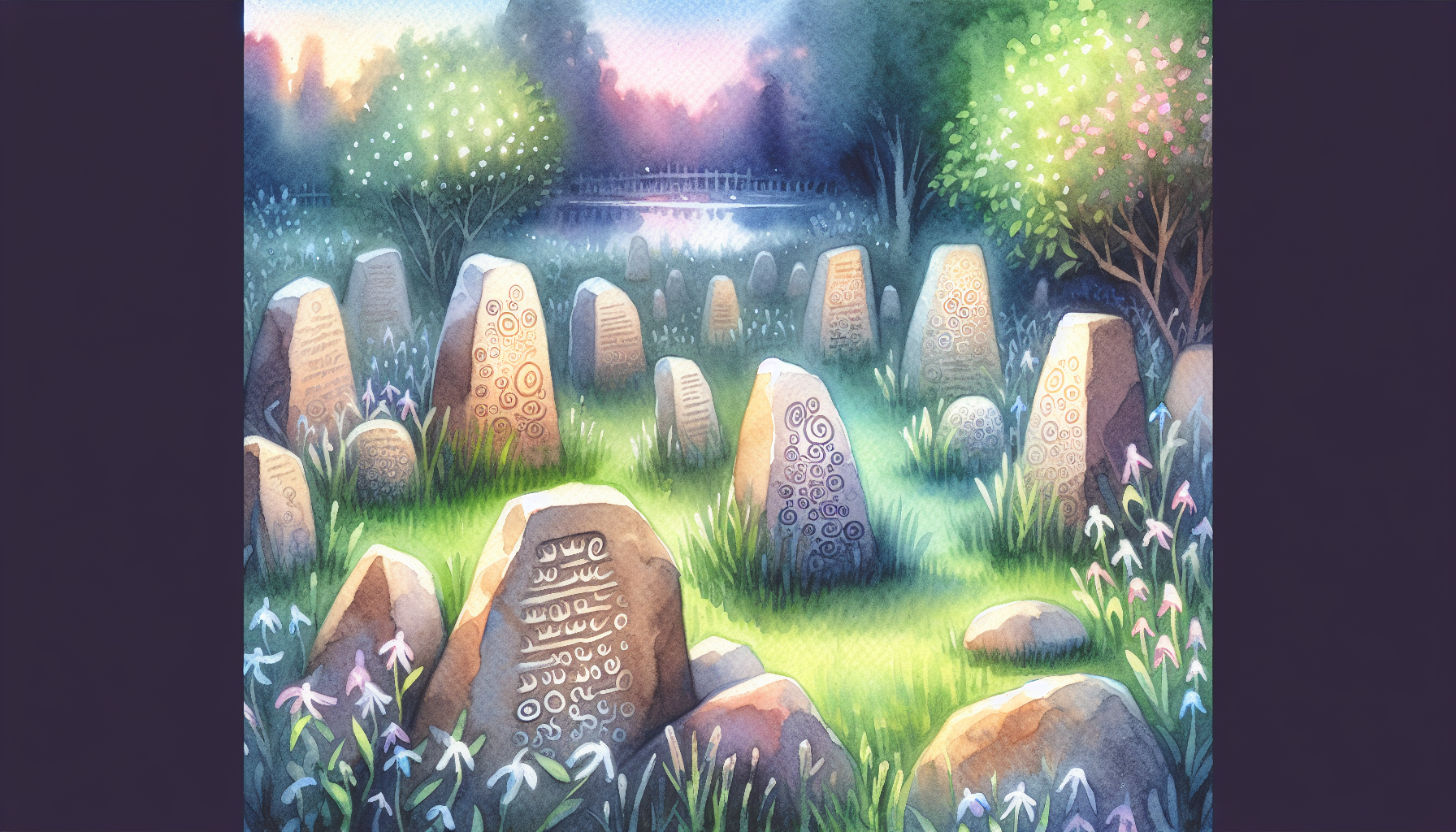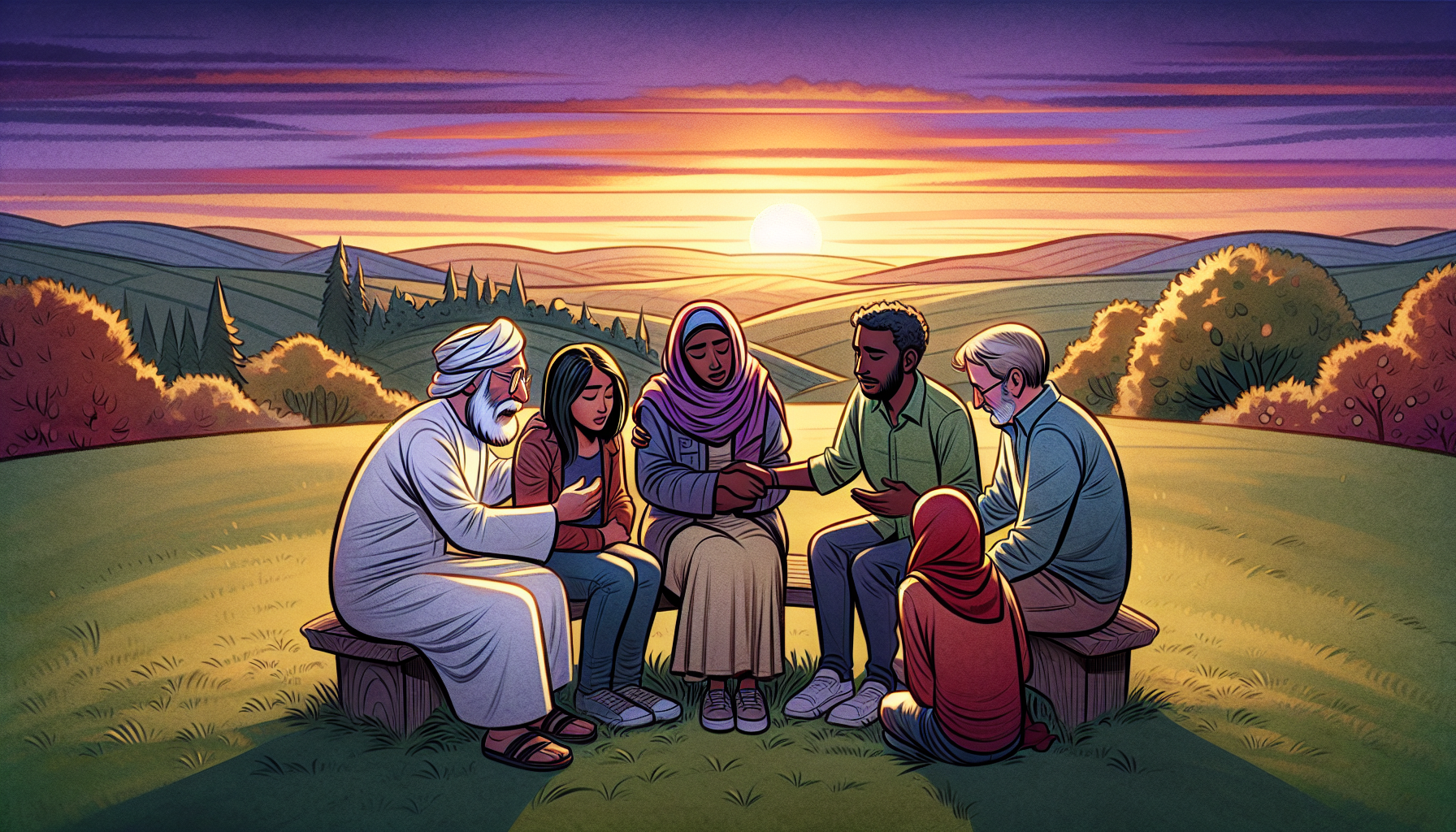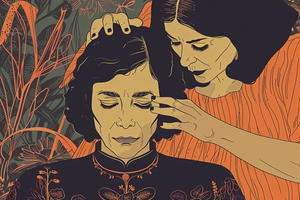The Essential Guide to Closure in Relationship: Finding Peace Through Mediumship

Why is closure in a relationship so hard to achieve, and how can you finally move on? This guide cuts through the confusion to offer you a path to peace. Discover practical steps and psychological insights that will help you close the chapter on a past relationship, all designed to assist you in your journey toward healing and growth with a focus on achieving “closure in relationship.”
Key Takeaways
-
Closure in relationships involves understanding and accepting the end of a relationship as a means to personal growth and preparation for future relationships, avoiding the trap of self-blame or partner-blame.
-
Psychic mediums can aid in achieving closure with deceased loved ones through mental and physical mediumship practices, but it’s important to approach these services with an open mind and a goal of finding peace.
-
Healing from the loss of a relationship requires expressing pain, building a support network, engaging in self-care, and ultimately finding personal strength to accept unanswered questions and embrace new beginnings.
Understanding Closure in Relationships

Closure in a relationship is the process of understanding and accepting the end of the relationship, and it’s an essential part of healing. Achieving closure is not just about moving on after the relationship has ended. It’s about gaining clarity on why the relationship ended, which in turn allows for new beginnings and personal growth.
However, closure, especially in non-abusive relationships, is not about blaming oneself or the partner. Instead, it’s about acknowledging what was, understanding what is, and accepting that the future holds possibilities beyond the relationship that ended. In doing so, it provides a sense of finality and peace, allowing us to accept and let go of the past and open our hearts to future relationships once the breakup occurred.
The Double Grief of Deception in Love
In the complex tapestry of love relationships, the end of a partnership can be as devastating as the death of a partner, especially when the severance is due to deception or betrayal. This emotional turmoil is often intensified when a partner's death reveals hidden truths, casting a pall of betrayal over once-cherished memories. Such revelations can lead to a unique form of mourning, where one grieves not just for the person they lost, but also for the trust and loyalty they believed they had. It's a piercing pain, akin to losing the same person twice—once in life, and once again in the truth that comes after.
One particularly moving example that remains etched in my memory is the story of a client who, in the wake of her husband's death, discovered his infidelity. The longing on her face and the love she held for her husband were obvious and serene as she recounted her experience to me: "My husband died twice" - she said, her voice a tender mix of love and sorrow. The first death was the physical loss, the void left by his absence. The second was the death of the man she thought she knew, the death of a marriage she believed was built on fidelity. To learn of her husband's affair with another woman after his passing was a cruel twist of fate, a second bereavement that led to an abyss of sorrow and disillusionment.
The Role of a Psychic Medium in Relationship Closure
In the journey towards closure, psychic mediums can play a significant role. They offer services to help people connect to their deceased loved ones, such as fathers, mothers, and siblings, facilitating closure in these relationships. However, it’s important to choose someone who is skilled and trustworthy, as the success of psychic readings can vary.
While some have reported positive outcomes, others caution that the effects are not guaranteed. It’s crucial to approach this process with an open mind and heart, understanding that the aim is not to revive the past but to find answers and make peace with it.
Communicating with Departed Loved Ones
Mediumship, the practice used by psychic mediums to communicate with the deceased, comes in two forms. ‘Mental’ mediumship involves sensing or receiving messages from spirits, while ‘physical’ mediumship produces material phenomena.
Psychic mediums utilize techniques such as séances, trances, and ouija boards to mediate this communication. In a trance state, mediums may allow spirits to control their minds for the purpose of communication. This opens a channel for the living to speak honestly with their departed loved ones, providing a unique path to closure.
The Journey to Personal Closure

Personal closure, while being deeply intimate and individual, can be facilitated through certain practices. Expressive writing, for example, serves as a form of therapeutic closure after a partner’s death.
Creating a personal ritual, such as reading poetry, playing favorite music, or frame and looking at photographs, can also foster a sense of closure. Engaging in these activities allows individuals to process their feelings, paving the way to acceptance and peace.
The Impact of Closure on Future Relationships

The importance of closure extends beyond the past and into our romantic relationship and future relationships. By understanding our own contributions to the relationship ends, we can learn and grow, leading to healthier future relationships.
Without closure, persistent grief and a warped sense of reality can impede the ability to form healthy connections and trust in future relationships. Thus, obtaining closure not only helps us heal from the past but also enables us to approach future relationships with a healthier mindset.
The Five Stages of Grief: A Healing Process
The five steps of grief are a framework that help us understand the rollercoaster of emotions experienced after a loss. They include:
-
Denial - A refusal to accept the loss, often characterized by shock and disbelief.
-
Anger - The stage where blame is sought, and frustration is directed outwardly or inwardly.
-
Bargaining - An attempt to negotiate away the pain, characterized by "what if" and "if only" statements.
-
Depression - A period of deep sadness recognizing the loss, where reflection and sorrow dominate.
-
Acceptance - The final stage, coming to terms with the reality of the loss and beginning to look forward again.
These stages are not linear and can occur in any order, but they represent a path towards healing and finding peace after a significant life change.
Healing Through Grieving Process
Healing is an inherent and non-linear aspect of the journey to closure. It involves:
-
Expressing pain instead of avoiding it
-
Building a support system of trusted friends and support groups
-
Sharing experiences to decrease feelings of isolation
-
Learning new coping skills
These steps can significantly help individuals in their healing process.
It’s important to remember that healing through grieving is a personal process with no set time frame. Avoiding unhealthy coping mechanisms and allowing the grieving process to unfold naturally contributes to a more wholesome healing journey.
Letting Go of Unanswered Questions
Unanswered questions can often be a stumbling block on the path to closure. However, finding peace with these questions is possible by communicating through mediumship to uncover answers, which can lead to self-forgiveness and acceptance. While the truth may initially lead to disappointment, over time it can be assimilated, allowing the mind to achieve closure once it is accepted. It’s important to remember that closure comes from within rather than from the deceased partner.
Engaging in dialogue with those who were close to the departed can also help process any unresolved feelings and unanswered questions.Engaging in dialogue with those who were close to the departed can also help process any unresolved feelings and unanswered questions. Writing heartfelt letters to the departed, whether to express lingering thoughts or to say the unspoken words, can be a cathartic part of the acceptance process. This acceptance of what we cannot fully understand is a crucial step towards finding closure and moving forward. Acceptance of what we cannot fully understand is a crucial step towards finding closure and moving forward.
Embracing New Beginnings After Loss

Embracing new beginnings after loss is a challenging but necessary part of the healing process. This requires acceptance of the situation, allowing time for grieving, and prioritizing self-care.
Maintaining regular daily routines provides a sense of continuity, while avoiding immediate drastic life changes offers emotional stability during the healing process. As we begin to embrace life’s transient nature, we can start to craft a narrative that includes:
-
pursuing new beginnings
-
reflecting on past relationship experiences
-
personal development
-
building the foundation for healthy relationships and healthier future relationships.
Navigating Intense Emotions During Closure
Closure often comes with a whirlwind of negative emotions. From grief and hurt to resentment, anger, and fear, these intense emotions are all natural reactions to the grieving process. It’s during these times that we realize why closure important, as it allows us to move forward and heal. In this context, closure refers to the emotional resolution we seek in order to find peace and create closure.
Establishing clear boundaries with a former partner is crucial in preventing further emotional turmoil and aiding in the journey towards closure. Additionally, preventative steps should be taken to limit the ex-partner’s potential to disrupt the individual’s healing process, especially through digital and social media contact.
Taking care of one’s mental health is also crucial during this intense emotional phase. Engaging in self-care activities like ensuring proper nourishment, adequate sleep, and regular exercise can significantly aid in managing these emotions. Joining support groups or seeking professional help can also provide a non-judgmental space to share feelings, significantly reducing feelings of anxiety and depression.
Creating Your Own Story of Closure
Creating your own story of closure is a powerful tool for healing and growth. This involves understanding why the relationship ended, accepting that it is over, and focusing on personal empowerment.
Finding meaning in the time spent with a departed partner and feeling gratitude for the shared experiences can support a movement from pain to peace. Living a rich and fulfilling life can serve as a tribute to the loved one, embodying a commitment to making the most of the lessons and love gained from the time together.
When Closure Feels Out of Reach
There are times when closure may feel out of reach. During such times, practicing self-compassion, seeking counseling, and focusing on new life goals can be beneficial.
Personal self-dialogue is key to understanding what emotional ties are being held onto and why, facilitating a journey towards closure. Building on personal strengths and positive self-perceptions can provide a foundation for moving on, even when traditional closure is unattainable. Setting new priorities and making future plans can instill a sense of direction and purpose, aiding those struggling to find closure.
Growth Through Connection: Embracing Spiritual Messages on the Path to Closure
One memorable case involved a client who sought to connect with her mother, who had passed away during childbirth. The emotional weight of never having known her mother was profound. When I have attempted to establish contact, the mother's spirit did not appear. Instead, the client was informed by her spirit guides that she was a "child of the stars," specifically from the Pleiades constellation, which left her feeling disappointed, angry, and confused. The session unexpectedly shifted towards self-development guidance, providing the client with practical advice for her personal journey, including a vivid description of where she would be living and how her future house would look like, which was so profound that she was left utterly astonished and clear of her next step in life.
Two years later, the same client returned, having undergone significant personal growth and life changes. She was now ready to communicate with her mother's spirit. This time, the mediumship session was transformative; her mother's spirit came through, resulting in a deeply healing and magical encounter. It was a testament to the idea that sometimes, we must evolve and grow before we are ready to receive certain messages from the spirit world.
Honoring the Memory of Your Loved One
Remembering a loved one is a deeply personal act that contributes to one’s journey toward closure. This can be achieved through various methods, from crafting keepsakes like pillows or quilts from their clothing to supporting a cause or charity they valued.
Initiating new traditions or revisiting cherished places enables the formation of new memories while continuing to honor the relationship that was shared. Keeping alive the stories of the loved one and maintaining their presence through photographs helps to preserve their memory in daily life.
Finding Strength in Community Support

Finding strength in community support is a critical step in the healing process. Creating a supportive environment with family members and friends, who can offer appropriate assistance and space for healing, is instrumental in the recovery process.
Online platforms, including social media and virtual groups, play a crucial role in connecting individuals with others who are also seeking support for relationship closure. Professional counseling or online therapy is recommended when the end of a relationship is particularly traumatic or grief is extended over a long period of time.
Addressing Guilt in Closure
Guilt is a common emotion that many individuals grapple with after the loss of a loved one. It can manifest in various forms, such as regret for things said or unsaid, or actions taken or not taken. A poignant example of this is a mediumship session I conducted where a daughter was burdened with guilt for not being present in the hospital room at the moment her mother passed away because she took a short bathroom break.
During our session, the mother's spirit communicated a profound message of comfort and understanding. She assured her daughter that it was her wish to pass away alone, to spare her the pain of witnessing her last moments. The mother's spirit emphasized that she had orchestrated the timing so that her daughter would be in the hospital, providing a sense of proximity and support, but not in the same room. This revelation brought immense relief to the daughter, alleviating her guilt and allowing her to embrace the closure she needed.
Summary
In summary, closure in relationships, especially after the death of a loved one, is a journey that encompasses understanding, acceptance, and healing. Achieving closure is not only about moving on after the relationship has ended, but it also involves gaining clarity on why the relationship ended, which in turn allows for new beginnings and personal growth.
While closure can often feel out of reach, with self-compassion, support, and personal empowerment, it is attainable. Remember that you are not alone in your journey and that there are resources and support available to help guide you through this process of healing.
Frequently Asked Questions
What is the role of a psychic medium in relationship closure?
The role of a psychic medium in relationship closure is to facilitate communication between the living and the spirits of the deceased, helping individuals connect with their loved ones who have passed. This can bring a sense of closure and comfort to those seeking answers or resolution in their relationships.
How can I achieve personal closure after mediumship session?
You can achieve personal closure by engaging in expressive writing, creating personal rituals, and memorializing loved ones. These practices can help you process your feelings and find acceptance and peace.
After a mediumship session, the sitter may feel the connection and the energy of the departed, as the session helps to tune into that frequency. This sense of presence can also occur while writing letters or performing rituals, fostering a powerful emotional connection.
How does closure impact future relationships?
Understanding our own contributions to a relationship's end can lead to healthier future relationships, while a lack of closure can impede the ability to form healthy connections and trust.
Can the loved one who passed away, whom I wanted to speak with, refuse to show up in a mediumship session?
Very rarely, this does happen. Yet, there are occasions when the soul of a departed loved one is occupied with working through its own emotions and development on the other side, which may prevent them from appearing in a session. Additionally, the readiness of the person seeking communication can also impact the connection. Factors such as extreme grief or anger might make it difficult for the session to proceed as hoped.
What can I do when closure feels out of reach?
During times when closure feels out of reach, practicing self-compassion, seeking counseling, and focusing on new life goals can be beneficial. Engaging in personal self-dialogue can help in understanding emotional ties and facilitating a journey towards closure. Additionally, this could indicate that self-work in the personal third dimension is essential before attempting to communicate with the spirit realm. Engaging in personal self-dialogue can help in understanding emotional ties and facilitating a journey towards closure.
How can I honor the memory of my loved one?
You can honor the memory of your loved one by crafting keepsakes, supporting a cause or charity they valued, and initiating new traditions or revisiting cherished places to form new memories. It's a way to continue honoring the relationship that was shared. After a mediumship session, the sitter may feel the connection and the energy of the departed, as the session helps to tune into that frequency. This sense of presence can also occur while writing letters or performing rituals, fostering a powerful emotional connection.


